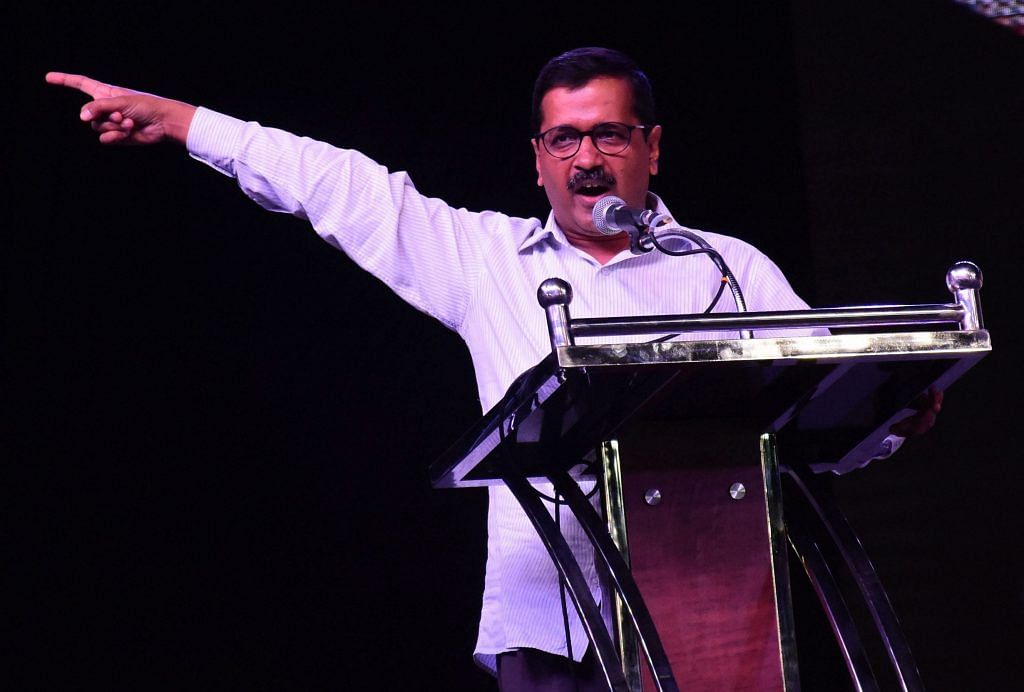Kejriwal’s dharna politics is taking a toll on the people of Delhi who believed in his poll promises and voted overwhelmingly for his Aam Aadmi Party.
Delhi chief minister Arvind Kejriwal is not new to dramatics. And this is certainly not the first time that he was sitting, or at times sleeping, on the sofa in protest, or what is popularly called dharna politics.
The Sanskrit word dharna (to hold, in this context it would mean to hold on to some demand until fulfilled) was reportedly and ironically used first in Pakistan around 1958 by Abdul Qayyum Khan against the then prime minister Feroze Khan. The word has travelled far and wide since, from the Communist trade union movement to the then Jan Sangh using it against Indira Gandhi.
Kejriwal, a former IRS officer, reportedly remained posted in the Delhi circle as long as he was in service, went on a long leave, took part in agitations, floated NGOs and seldom reported to work, but allegedly continued to draw salary.
Now, he has accused his own IAS officers in the Delhi bureaucracy of not working, going on strike and drawing salary.
As he embarks on yet another long innings of protest, this time from the office of the Lieutenant Governor, Kejriwal will be the only chief minister to go down in the history as one who went against his own officers, sat on a protest against his own government and never completed any responsibility that he undertook.
Kejriwal’s dharna politics is taking a toll on the people of Delhi who believed in his poll promises and voted overwhelmingly for his Aam Aadmi Party (AAP).
Jumping ships
The NDA government in 2002 enacted the Freedom of Information Act. This Act had all the provisions that were required for seeking information. After 2004 elections, the UPA government set up an extra- constitutional body called the National Advisory Council under the chairmanship of Sonia Gandhi.
This group purportedly wanted to appropriate credit for freedom of information and floated the idea of Right to Information, the now famous RTI. Kejriwal jumped into this bandwagon and shot to fame as the man behind the idea. Half way through, he jettisoned this and was believed to have joined another upcoming leader Baba Ramdev, who floated an outfit called Bharat Swabhiman.
Soon, he left this outfit and as luck would have it, Anna Hazare started a campaign against corruption. Kejriwal jumped into the Hazare bandwagon and became the leader of India Against Corruption movement.
Kejriwal jettisoned this group too. Hazare was against political parties and strongly advised his followers to stay away from politics. The proposition, perhaps, did not suit Kejriwal. By this time, he had earned enough name, fame and also money.
The Ford Foundation, working on a budget of about $15 million, was involved in providing huge donations to institutions, think-tanks and civil society. One such institution, NGO Kabir, which was floated and run by Manish Sisodia and Kejriwal, got about $400,000 between 2005 and 2010.
Abdicating responsibility
In keeping with his tradition of not completing any responsibility, Kejriwal has now embarked on his next drama. As chief minister, he once sat on a dharna against the UPA government in January 2014. Subsequently, he began his rants and complaints against the Modi government.
The demand for control over Delhi Police and statehood for Delhi – made by Kejriwal and his predecessors – were considered and rejected on valid grounds by previous governments at the Centre, including Manmohan Singh-led UPA.
The BJP and Congress chief ministers in Delhi during the last two decades did not launch a direct confrontation with the Union government over the issue. They all had their share of disagreements with the Centre but continued doing their work – Sheila Dikshit being a case in point.
Kejriwal’s blatant lie that IAS officers were striking work was exposed when their representatives held a press conference and blew the lid off the canard. It is unfortunate that an elected chief minister is seemingly more concerned with promoting his self-image and positioning himself as a leader of the so-called third front rather than earning merit through good work.
Some of the chief minsters and non-Congress, non-BJP leaders, who are at the forefront of forming a third front, are at least leaders with proven track record in their respective states. One may have differences of opinion with them over their ideology, but none of them can be accused of hitting a new low with theatrics.
One can only hope that these leaders see through the dharna politics of Kejriwal.
The author is former editor of ‘Organiser’.
